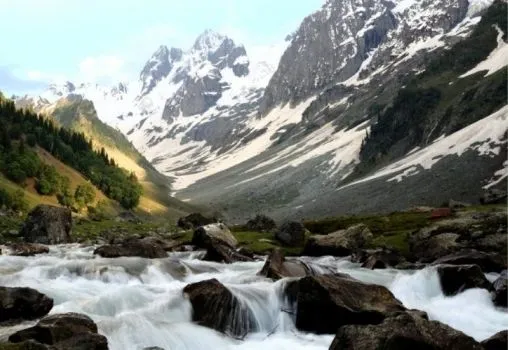M. Seedat
Impacts of climate change on human lives in the disputed territories are much more than the settled territories. We as a society should show a collective response and concerted action to save vulnerable populations in the disputed territories like in Indian illegally occupied Jammu and Kashmir.
Climate change is, in fact, a global phenomenon and it poses a serious threat to people living in the conflict-hit regions where communities face myriad challenges and vulnerabilities compounded by political conflicts, violence and heavy militarization. The territory of Jammu and Kashmir, illegally occupied by India, is one of the world’s worst hit regions where climate change has affected the lives of Kashmiri people in many different ways.
The long drawn conflict, on the one hand poses a serious risk to life, health, food and living of individuals and communities across the territory while on the other fluctuating temperatures, melting glaciers and incessant rains causing flash floods have wreaked havoc on key sectors of the region’s economy.
The rising temperatures have led to severe water shortage in Kashmir. The water scarcity has also adversely impacted the region’s agriculture sector which has affected the crop yield besides disrupting the food supply and access to quality food.
Like other parts of the world, Kashmir has also witnessed a significant decrease in groundwater. The wetlands of Kashmir that host hundreds of species of birds round the year, have been affected by climate change.
The United Nations-designated disputed terri-tory is also a host to world’s top snow peaks, gla-ciers and rivering system – a dimension which was being deeply neglected amidst intense conflict.
Climate change can be a driver of conflict but in the case of Jammu and Kashmir, the conflict itself has potential and is acting as a driver of climate change.
The developed countries must come forward in a big way to help the climate change prone countries to boost up their ability to respond to disasters and cope up with climate challenges.
The massive troops’ concentration in Kashmir is a major contributing factor to serious climatic issues to local habitat.
The deployment of more than nine hundred thousand troops by India in the disputed territory armed with heavy artillery is a major destabilizer for local ecology.
The troops deployed on the fast melting Siachen Glacier are disrupting the natural ecosystem and military activity is hugely contributing to the rise in temperature. Concerted efforts, a robust initiative and broader regional approach are needed to address the climate crisis.
Besides collaboration between the communities and state institutions, early warning systems, data sharing mechanisms beyond borders are required to minimize losses during natural calamities.
Trust and relationships among communities can only be forged by resolving conflicts, addressing political issues like the issue of Jammu and Kashmir.










